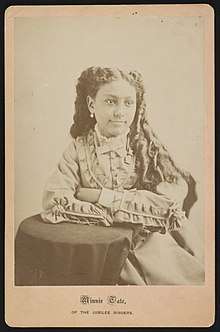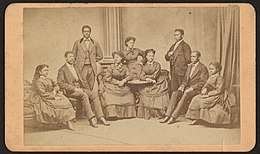Minnie Tate
Minnie Tate (1857 – April 29, 1899) was the youngest original member of the Fisk Jubilee Singers, based in Nashville, Tennessee.
Minnie Tate | |
|---|---|
 Minnie Tate, from the Library of Congress. | |
| Born | 1857 Nashville, Tennessee |
| Died | April 29, 1899 Nashville, Tennessee |
| Nationality | American |
| Other names | Minnie Tate Hall (married name) |
| Occupation | singer |
| Known for | Original member of the Fisk Jubilee Singers |

Early life
Tate was born in Nashville, Tennessee, the daughter of Andrew L. Tate and Adelle A. Livingston Tate. Her grandmother, Dicey Tanner, and mother, Adelle, were freed from enslavement in Mississippi, and migrated north. Tate's mother was a teacher. Tate enrolled at Fisk University.[1][2]
Career
Tate and Eliza Walker were the youngest members of the Fisk Jubilee Singers when it first formed in 1871; both were fourteen years old that year.[3][4] Tate's "sweet, clear voice" was showcased in the song "Flee as a Bird" in their performances.[5] The Fisk Jubilee Singers performed African-American spirituals. They also sang songs by white composer Stephen Foster. Their performances raised money for Fisk, and eventually paid for Jubilee Hall on the Nashville campus.[6][7] She was the youngest of the group when they toured Great Britain, Holland, and Germany, singing for Queen Victoria, William Ewart Gladstone, Dwight L. Moody, Mark Twain, Henry Ward Beecher, Ulysses S. Grant, and others.[8]
The physical strain of that tour made Minnie Tate give up professional singing upon her return to the United States.[9] In 1880, she and fellow Jubilee Singer Georgia Gordon sang a duet at an event marking the ninth anniversary of the group's formation.[10]
Personal life
Tate married a fellow singer, R. A. Hall; they had a son, Roger. She was widowed in 1886. She died in 1899, in her early forties, in Nashville.[11] In 1978, Tate and the other original members of the Fisk Jubilee Singers were granted posthumous honorary Doctor of Music degrees from Fisk University.[12] It is traditional for current Fisk Jubilee Singers to sing and place a wreath of magnolia leaves at the Nashville grave of Minnie Tate every year.[13][14]
References
- Gustavus D. Pike, Jubilee Singers and their Campaign for Twenty Thousand Dollars (1873): 60.
- Clara Merritt DeBoer, His Truth is Marching On: African Americans Who Taught the Freedmen for the American Missionary Association, 1861-1877 (Routledge 2016). ISBN 9781315408323
- Don Cusic, The Sound of Light: A History of Gospel and Christian Music (Hal Leonard Corporation 2002): 97. ISBN 9780634029387
- Arthur C. Jones, Wade in the Water: The Wisdom of the Spirituals (Leave a Little Room Foundation 2005): 139. ISBN 9780976237709
- "Concert at the New England Church" The American Missionary (January 1872): 1-3.
- Sandra Graham, "On the Road to Freedom: The Contracts of the Fisk Jubilee Singers" American Music 24(1)(Spring 2006): 1-29.
- "Singers Rescued School with Voices" The Daily Oklahoman (December 15, 1995): 171. via Newspapers.com
- "The Beginning of Jubilee Singing" The Lyceum Magazine (April 1920): 18-19.
- J. B. T. Marsh, The Story of the Jubilee Singers: With Their Songs (Houghton Mifflin 1881): 116.
- "Jubilee Day at Fisk University" The Tennessean (October 7, 1880): 1. via Newspapers.com
- Ella Sheppard Moore, "The Original Jubilee Singers" The American Missionary (August 1902): 358.
- Saundra Ivey, "Fisk Grads Told Blacks Must Still Battle High Unemployment" The Tennessean (May 16, 1978): 5. via Newspapers.com
- "Jubilee Singers" The Clarksdale Press Register (October 12, 1995): 12. via Newspapers.com
- Tyronne Drummond, "Jubilee Singers Mark 119" The Tennessean (October 10, 1990): 55. via Newspapers.com
External links
- Minnie Tate at Find a Grave
- A stereograph portrait of Minnie Tate, from the Schomberg Center for Research in Black Culture, New York Public Library Digital Collections.
- An illustration of Minnie Tate, from Gustavus D. Pike, Jubilee Singers and their Campaign for Twenty Thousand Dollars (1873).